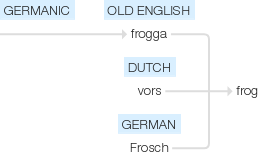Frog
Old English frogga, of Germanic origin; related to Dutch vors and German Frosch . Used as a general term of abuse in Middle English, the term was applied specifically to the Dutch in the 17th century; its application to the French (late 18th century) is partly alliterative, partly from the reputation of the French for eating frogs' legs.
wiktionary
From Middle English frogge, from Old English frogga, frocga(“frog”), from Proto-Germanic *fruþgô(“frog”).
From frog legs, stereotypical food of the French. Compare French rosbif(“English person”), from roast beef, corresponding term for English, likewise based on stereotypical food; and Kraut for Germans.
Unknown. Possibly borrowed from Portuguese froco(“flock”), from Latin floccus(“flock”).
Supposedly from ribbit(“sound made by a frog”) sounding similar to " rip it".
etymonline
frog (n.1)
Old English frogga "frog," a diminutive of frosc, forsc, frox "frog," a common Germanic word but with different formations that are difficult to explain (cognates: Old Norse froskr, Middle Dutch vorsc, German Frosch "frog"), probably literally "hopper" (if from PIE root *preu- "to hop," source also of Sanskrit provate "hops," Russian prygat "to hop, jump"). Watkins calls the Old English -gga an "obscure expressive suffix."
The Latin word for it (rana) is imitative of croaking. Also in Middle English as frok, vrogge, frugge, and with sometimes plural form froggen. Collateral Middle English forms frude, froud are from Old Norse frauðr "frog," and native alternative form frosk "frog" survived in English dialects into the 19c.
I always eat fricasseed frogs regretfully; they remind one so much of miniature human thighs, and make one feel cannibalistic and horrid .... [H. Ellen Brown, "A Girl's Wanderings in Hungary," 1896]
As a British derogatory term for "Frenchman," 1778 (short for frog-eater), but before that (1650s) it meant "Dutch" (from frog-land "marshy land," in reference to their country).
The principal inn on the island of Texel is called the Golden Frog, (de Goude kikker). We may wonder that there are not more examples of this sign in Holland, for there are, without doubt, as many frogs in that country as there are Dutchmen ; and even unto this day it is a mooted point, which of the two nations has more right to the possession of the country ; both however are of a pacific disposition, so that they live on in a perfect entente cordiale. [Larwood and Hotten, "The History of Signboards," 1866]
To have a frog in the throat "be hoarse" is from 1892, from frog as a name for a lump or swelling in the mouth (1650s) or throat infections causing a croaking sound.
frog (n.2)
type of fastening for clothing, 1719, originally a belt loop for carrying a weapon, of unknown origin; perhaps from Portuguese froco, from Latin floccus "tuft of wool," a word of unknown etymology.
